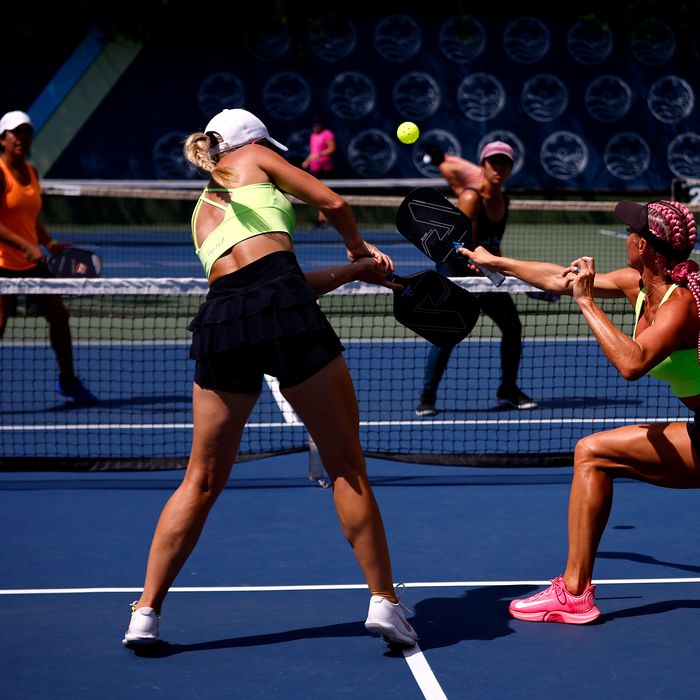Pickleball Looks Really Dumb on TV

Photo: Ronald Martinez/Getty Images
America’s leading newspapers and magazines appear to publish a new article about Pickleball every 20 minutes. Common themes include: the bitter feud between pickleball players and the tennis players whose courts they have infiltrated; the bitter feud between pickleball players and local residents who can’t stand the characteristic “pop” of balls coming off the paddle and entering their airspace; and the community-building magic of the sport itself (this genre often depicts the ultimate conversion of a once-skeptic).
The Sports & Fitness Industry Association estimates that 4.8 million Americans played pickleball in 2021 (recently, the Association of Pickleball Professionals put the number of players at 36.5 million last year). It’s been a long time since a sport rose from obscurity to ubiquity so quickly, and with its wide and still growing fan base, this one seems to be here to stay. Now, after a period of explosive grassroots growth during the pandemic, Pickleball has entered a more mature phase in its development: the cash heist. Dueling professional tours criss-cross America. Pickleball superstars have emerged despite not being well known to the general public. Prominent sports investors like LeBron James and Tom Brady (whose financial judgment has proven impeccable) are saturating the Pickleball space.
The natural next question for the corporate interests wanting a piece of all this is whether Pickleball can be televised. A recently Just A piece examining the question notes that Fox Sports, the Tennis Channel and ESPN are already showing games, but the sport’s bigwigs are keen to significantly expand their presence in outlets. Pickleball has successfully colonized America’s recreational spaces. Can it colonize America’s eyeballs?
Well, I already have the answer, and it’s one that could save networks a lot of money. That answer is “absolutely not”. Why? Simple: Pickleball looks really stupid on TV. To prove this fact beyond dispute, all you have to do is watch a minute or two of a quality game. Here’s one I picked quite at random: a showdown between Ben Johns, the world’s top pickleball player in singles and doubles, and JW Johnson, who won multiple medals at last year’s New York City Open, one of many new pickleballs -Events .
There’s a certain joyful novelty at work, but can you seriously imagine seeing more than five minutes of it on your TV or phone? Can you imagine getting emotionally invested in the ups and downs of a pickleball game that you haven’t personally witnessed? Can you imagine pickleball supplanting every other sport you currently watch?
And again, these are the best professionals!
The main problem is Pickleball’s inherent nonchalance. The sport’s accessibility — the playing surface is a fraction of the size of a tennis court — is perhaps its key selling point. The barrier to entry and even a believable level of play are very low, which is one of the reasons it has become so popular, especially among older Americans. From a television point of view, however, this is an Achilles’ heel. The best players in the world are undeniably talented, but the basic setup of the sport makes it impossible for someone playing it to look that impressive. Of course, there are all sorts of advanced strategies to become a world-class pickleball player. However, the physical manifestation of these strategies doesn’t make for exciting viewing since the players don’t move all that much. It’s all too slow to be very dynamic.
What is outwardly lacking is a clear display of athleticism – it’s a thing that the most popular televised sports have in common. Pickleball, on the other hand, is tailor-made for people who may fare far worse at more physically demanding activities. That puts it in the bowling or curling category: sports in which the average TV viewer can too easily imagine accomplishing at least some of the feats shown.
If the game itself wasn’t enough of a problem, there’s the audio. The cracking of a baseball bat; the hit of a tennis ball; the brutal beating of bodies in football; these are all satisfying and evocative, even primal. Pickleball’s sound motif is that crunchy “pop” over and over again. It’s a noise that, when not directly irritating, means family fun, lovable silliness — not high-profile competition. It all adds up to a viewing experience that seems right at home on Tubi channel 423, or, to put it in ’90s kid terms, on ESPN at 3:30 a.m., just after the World’s Strongest Man Championships.
Pickleball has taken America’s assisted living facilities and much of the rest of the country by storm. It has successfully rocked tennis loyalists across the country. (I’m one of them, as you might have guessed.) But its appeal only goes so far because it’s just too damn goofy for prime time.